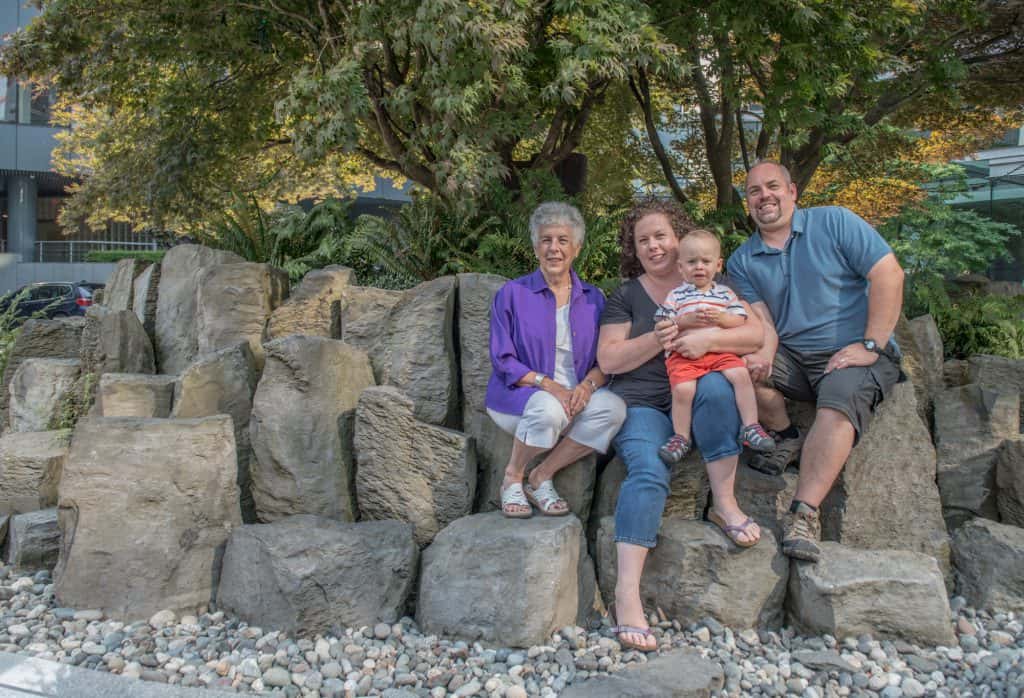Barbara gave her son-in-law a kidney so he could watch his son grow up
Rhonda and Alastair Mills were married in May, 2014. Prior to their wedding, Alastair had been experiencing headaches and fatigue, highly unusual for the avid cyclist, who had always been in excellent physical condition.
Just four months into their marriage, Alastair and Rhonda’s world was turned upside down when Alastair was diagnosed with end stage renal failure.
“The kidney failure had been discovered inadvertently, during routine bloodwork,” says Rhonda, who works as a Clinical Nurse Educator on the renal unit at St. Paul’s.
Alastair had gone in for blood work hoping to find the cause of his headaches and tiredness. No one was expecting such a dire diagnosis.
“When we realized that Alastair was going to need to go to hospital,” says Rhonda, “we did not even consider anywhere else—he was coming to St. Paul’s.”
It wasn’t just that Rhonda worked on the St. Paul’s renal unit and knew of its expertise that made her want Alastair to be treated there. That was part of it, but there was something else, too.
Rhonda’s second family
“When you work here,” says Rhonda of St. Paul’s, “you become part of a family. Your colleagues are like this second family to you. St. Paul’s is a special place in this way. So I felt that my family here at St. Paul’s would take care of all of us.”
Alastair felt it, too.
“You feel taken care of,” he says. “It’s a special environment. Rhonda is right when she says it’s like family.”
The renal physicians said they hoped to hold off on dialysis as long as they could by stabilizing Alastair’s condition but instead it worsened. Within two years of his diagnosis, Alastair had become too ill to work. He and Rhonda also had their 15-month-old son, Alex, to care for. With a lifetime of dialysis looming, Alastair, just 39 at the time, was advised to look for a kidney donor.
With no matches in his immediate family, Alastair began to contact friends. Meanwhile, both of Rhonda’s parents got tested to see if they were a match. Her father wasn’t. But her mother, Barbara, was.
Despite her age (she was 72 at the time) Barbara passed all tests with flying colours and doctors saw no risks in her undergoing the procedure. And besides, her mind was already made up. She wanted to help her family.
“They had their whole lives ahead of them,” says Barbara, “so Alastair needed to be healthy so he could take care of my daughter and their young son. I was a match, so I could help to make that happen.”
“But my reaction,” says Rhonda, “was more like, ‘Not so fast, mom.’”
What if something went wrong?
Rhonda went on what she describes as a “personal journey” as she began to weigh all the options and look at the situation—her mother as organ donor to her husband—from all possible angles.
“There’s the risk of the procedure,” says Rhonda, “but then there are risks like, if something happened to my mother, how would that affect me? How would that affect my relationship with Alastair? What about the guilt Alastair would experience if something happened? And where would it leave my father? All of these possible outcomes needed to be considered. So it was never an immediate yes. There was lots to think about and talk about.”
Ultimately, Rhonda considered her own experiences working on the renal unit. She has seen how the team takes care of people. She knew her mother would have never been approved unless she had been healthy and fully able to donate. Once she reminded herself of the many positives, Rhonda felt better about her mother going ahead with the donation. So did Alastair.
“This goes to show you,” says Rhonda, “an illness affects the patient’s family, too. Spouse, parents, siblings, everyone. A major illness is hard on the whole family.”
Two surgeries in 12 hours
While many kidney transplant recipients feel great as soon as they wake up from the procedure, with many saying the pain they had endured for years is gone, Alastair had complications. There was clotting and he needed another surgery, which would make it two surgical procedures within 12 hours.
“They pretty much had to take the kidney out, clean it, and put it back in,” he says.
As well, due to the medications and the rigors of a second surgery, Alastair’s incision was slow to heal, and this in fact required a third surgical procedure. In all, it would be several more months before Alastair began to feel normal again. But today, he does. He finally feels normal again. So does Rhonda.
“It has been a tough journey,” says Rhonda. “Only now are Alastair and I getting on with our life together without his illness. So we’re both very grateful. And we both agree that we couldn’t have found better care than the care we received at St. Paul’s. The St. Paul’s team is like family to us. It will always be that way.”
You can make a donation to support renal care and research at St. Paul’s now by clicking the donate now button below.
